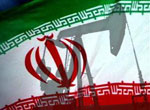 Reuters: Iran acknowledged on Saturday that oil swap deals with Caspian Sea producers had stopped, but said it was seeking talks with some oil companies on new terms.
Reuters: Iran acknowledged on Saturday that oil swap deals with Caspian Sea producers had stopped, but said it was seeking talks with some oil companies on new terms.
 TEHRAN June 19 (Reuters) – Iran acknowledged on Saturday that oil swap deals with Caspian Sea producers had stopped, but said it was seeking talks with some oil companies on new terms.
TEHRAN June 19 (Reuters) – Iran acknowledged on Saturday that oil swap deals with Caspian Sea producers had stopped, but said it was seeking talks with some oil companies on new terms.
Industry sources said in May that producers would suspend oil swaps with Iran from June 1 after Tehran steeply raised fees on operations to avoid an oil glut following lower sales of its own crude. They said Iran had deliberately made it uneconomic.
Iran, which faces new sanctions imposed last week by the U.N. Security Council over its nuclear programme, has swap arrangements with Central Asian producers under which it imports crude into Caspian ports and supplies the equivalent barrels on behalf of its partners in the Persian Gulf.
“Negotiations to set a real oil swap formula are in the making,” Hossein Noghrekar Shirazi, deputy oil minister in charge of international affairs, was quoted as saying by semi-official news agency Mehr.
“With oil swaps, the national interest must be preserved. Oil swaps should not overlap with Iran’s own crude oil markets and must be done by as much as the country’s needs.”
Shirazi said the average daily swap was 90,000 barrels last year but Iran would have the capacity for 300,000 bpd by 2015.
Mehr named four firms it said had shown lack of interest in renewing swaps: Dragon Oil, Vitol, Select Energy Trading and Caspian Oil Development.
In April, industry sources said oil and gas explorer Dragon Oil’s crude swap deal with Iran was in jeopardy of not being renewed as Tehran reviewed its economic merits.
An industry source said last week Kazakhstan and Turkmenistan may redirect oil exports to Russia’s Black Sea port of Novorossiisk rather than shipping it to Iran due to the new round of sanctions.
Kazakhstan has been pumping oil to Iran at a rate of 1.2 million tonnes per year. Turkmenistan exports 2 million tonnes per year, but it is unclear how much goes to Iran.
Consumers in Asia are also cutting intake of Iranian crude and looking at diverse sources.
In April, Russia’s second-largest crude producer, LUKOIL, stopped gasoline sales to Iran because of measures imposed earlier. (Reporting by Hashem Kalantari, writing by Andrew Hammond; editing by Patrick Graham)


